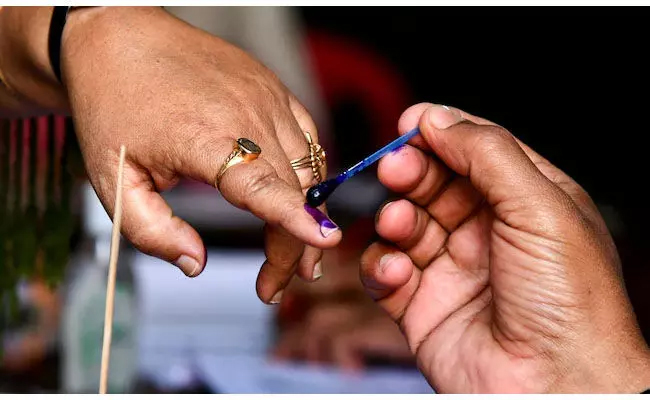New Delhi (PTI): Union Minister Shobha Karandlaje demanded on Tuesday Karnataka Chief Minister Siddaramaiah's resignation, claiming that he was involved in the alleged Mysuru Urban Development Authority and Karnataka Maharshi Valmiki Scheduled Tribe Development Corporation scams.
At a press conference at the BJP headquarters here, Karandlaje said Siddaramaiah must immediately tender his resignation for a "fair and impartial" probe to take place in the matter as he also holds the state finance minister's portfolio and is trying to "cover-up" the financial irregularities that took place at his behest in the two corporations.
"He (Siddaramaiah) has taken money, not just from the Valmiki Development Corporation but from every corporation in the state. It should be probed. At the behest of Siddaramaiah, Rs 187 crore was illegally transferred from the Valmiki Development Corporation to Hyderabad. Money belonging to SCs, STs and the poor was used in funding the Telangana assembly elections," the BJP leader charged.
"He is also involved in the MUDA land scam. Siddaramaiah's wife was allotted plots under a 50:50 ratio scheme. And he is trying to hush up and cover up the scams. He must immediately resign so that a fair and impartial probe can take place," she alleged.
The Union minister also said that Karnataka has become "an ATM for the Congress and its high command".
Scheduled Caste and Scheduled Tribe Sub Plan funds are being diverted to fund the implementation of the guarantees that Congress gave the people of the state during the elections, she charged.
The BJP is up in arms against the ruling Congress in Karnataka, claiming that Siddaramaiah was involved in the two cases of financial irregularities in the state corporations.
The illegal money transfer issue involving the Karnataka Maharshi Valmiki Scheduled Tribes Development Corporation Ltd came to the fore after its accounts superintendent Chandrashekhar P died by suicide on May 26, leaving behind a note.
The note alleged an unauthorised transfer of Rs 187 crore from the corporation's bank account. It also claimed that Rs 88.62 crore of the total amount was moved to various accounts belonging to "well-known" IT companies and a Hyderabad-based cooperative bank among others.
Following the allegations against him in connection with the "scam", Scheduled Tribes Welfare Minister B Nagendra tendered his resignation on June 6. He is currently in Enforcement Directorate custody.
The MUDA case is linked to the fraudulent allotment of sites by the authority to land losers and involves plots given to Siddaramaiah's wife Parvathi.
MUDA had allotted plots to Parvathi under a 50:50 ratio scheme in place of 3.16 acres of her land where it developed a residential layout.
The controversial scheme envisages allotting 50 per cent of developed land to the land-loser in lieu of undeveloped land acquired for forming layouts.
Let the Truth be known. If you read VB and like VB, please be a VB Supporter and Help us deliver the Truth to one and all.
Hyderabad (PTI): Asserting that war and warfare is at the cusp of a major revolution, Chief of Defence Staff (CDS) General Anil Chauhan on Saturday said the Indian Defence forces are committed to adapting to changing environment and imbibing reforms to remain ready and relevant.
Addressing the Combined Graduation Parade (CGP) of 216 Course held at the Air Force Academy at Dundigal near here, General Chauhan said India's strength rests on robust institutions, democratic stability, and unwavering professionalism of our Armed Forces.
He said the intensity of operations may have ebbed, but Operation Sindoor continues.
"You (new officers) also join the Air Force at a moment when a new normal has firmly taken shape. An era defined by a high degree of operational preparedness, 24-7, 365 days. The intensity of operations may have ebbed, but Operation Sindhur continues," he said.
He further said the newly trained officers are entering the Indian Air Force during a phase of deep transformation of the Indian Armed Forces.
Integrated structures, joint operations, and national pursuit of Atmanirbhar Bharat in defence are shaping the future of India's military strength, he said.
"Your journey ahead will be accordingly guided by Jai, the first word of Jai Hind, that's victory. 'J' stands for jointness, fighting as one nation, one force. 'A' stands for Atmanirbhar Bharat, trusted platforms and systems made not just for India but for the world. And finally, 'I' for innovation, daring to think ahead and to be ahead of the curve," he explained.
General Chauhan further said battles in the older domains will always remain contested, often brutal. But in the new domains, they will be smart, swift, and shaped by intellect, innovation, and initiative. The force that masters new frontiers is more likely to prevail in future conflicts.




